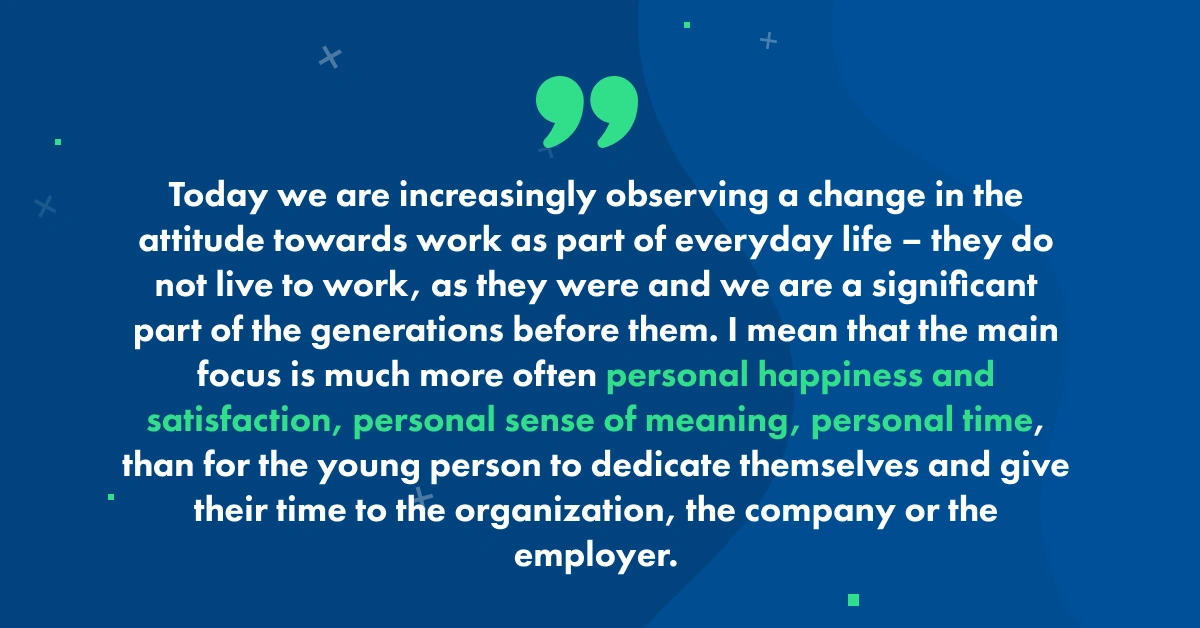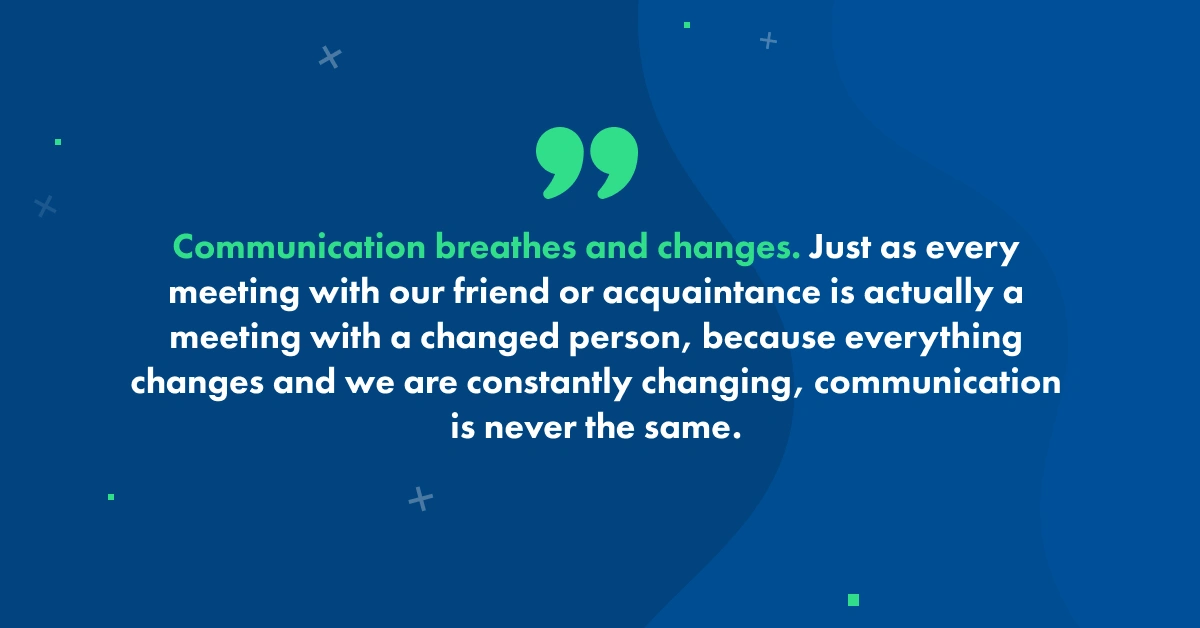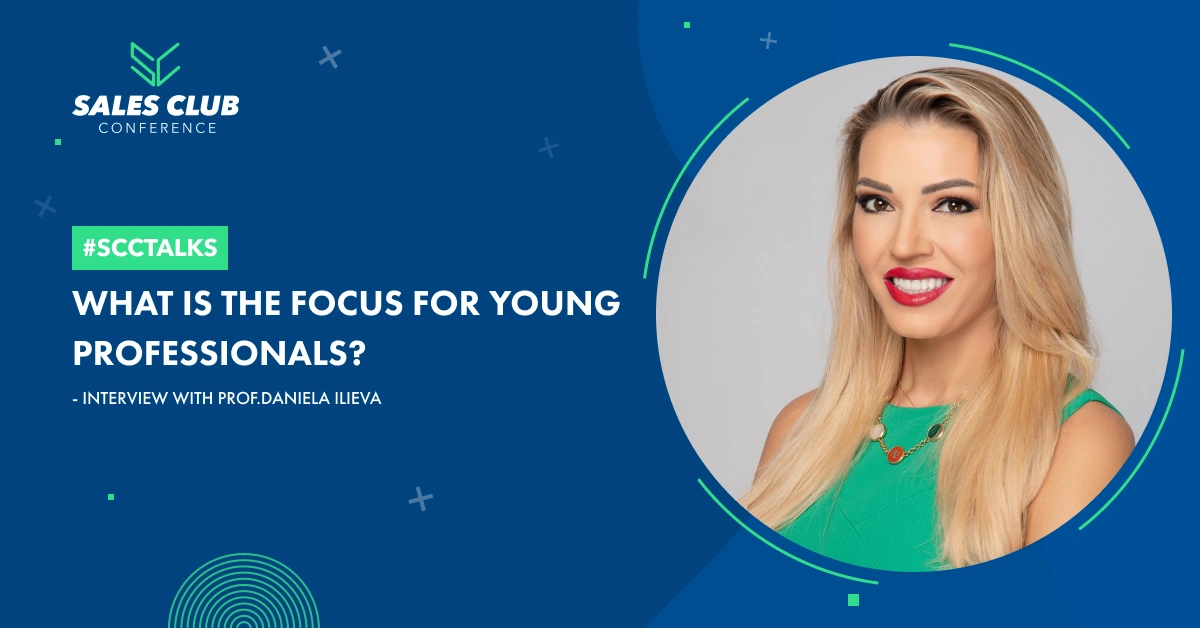Blog " What is the focus for young professionals?
Prof. Ilieva, first of all, we would like to thank you for the opportunity to participate in the second edition of. Sales Club Conference 2023During our first meeting, we talked about behavioral patterns and the changes that can be observed between generations. What are your impressions from the perspective of a professor, particularly in five different universities, where differences are also observed among representatives of the same generation? In fact, these are the representatives of Generation Z, who are said to be creative and entrepreneurial, pursue their dreams, and seek their happiness.
Thank you as well for the opportunity to be part of your event, which, with each passing year, becomes more and more significant for the Bulgarian business environment.
I’m often asked, 'What are young people like, how are the students?' The fact is that each 'generation' of students, as I call them, is different, unique in its own way, and has its own characteristics. Today, we are increasingly observing a change in the attitude towards work as part of daily life – they don’t live to work, as many of the generations before them did, including myself. What I mean is that The main focus is much more often on personal happiness and fulfillment, a personal sense of meaning, personal time, rather than the young person dedicating and giving their time to the organization, the company, or the employer. Regardless of the compensation, bonuses, trust, or other secondary benefits. Of course, money is important, but it’s not the most important thing.
We observe many ambitious young people, but impatience, or rather Impatience and lack of persistence often prevent ambitions from being realizedThey want everything fast and now, even immediately. Sometimes, freshly graduated students approach things with such enviable confidence that we can even learn from them. The dynamics have become so fast, social media and various media constantly bombard us with all sorts of success stories, but as we know, nothing is as it seems.

On the other side of the barrier are employers, who claim that it’s harder to work with the representatives of each succeeding generation. What are the reasons? Why?
One of the reasons for the gap between expectations and reality on both sides—employers and employees—are generational differences. History is important because we all need to remember what was happening in our country when today's graduates, entering the labor market, were born—the turbulent times around the year 2000. And we can’t be upset about why they are this way or that way, but rather remember what the educational and social systems were like. What did their parents do, what was life like, who and how took care of these babies and children, and what value system was formed in them. Of course, we can’t generalize, but there is definitely Generational characteristics and the clash between the values of different generations.
Personally, I believe that we can all learn from each other—each succeeding generation is more 'nimble' and 'fluent' with technology. And life for all of us without technology is unthinkable. Everyone has something to take from and give to each other. What’s important is acceptance and understanding, the historical context, and getting used to the dynamics and changes inherent in today’s society and life.
Are we facing a talent crisis? Can we expect any changes in the relationships between potential employers and the new generation of professionals? Does this change signal a fresh start, or are we not yet mature as a society?
We ARE in a talent crisis. The pandemic, the home office model, and now the shift towards a predominantly hybrid work model have taken away a significant part of the old form of control from employers. There are introverts, experts in various fields, who have worked excellently remotely even before the pandemic. But now The change is much more social, making us all reflect on the more important things in life, on the balance between personal and professional life, as well as on what we might miss out on if we dedicate a few more hours to work instead of... and here we can list the entire range of diverse temptations that the environment offers.

Besides being a professor, you are many other things, but they all share one common direction – communication. You are the author of several books, but one of them particularly catches our attention – 'Communication in Time and Place.' As a manager, professor, author, and professional trainer, you communicate daily with different people from different target groups, with different goals and development paths. What do they have in common? How do these different generations, with different goals and perspectives, communicate? Do you have observations on the differences in behavior patterns?
The topic of successful communication, in time and at the right place, is not only my favorite but also a key focus of my research. Communication breathes and changes. Just like every meeting with a friend or acquaintance is actually a meeting with a changed person, because everything changes and we change constantly, communication is never the same. Therefore, there is no recipe. There is curiosity, respect for differences, genuine interest in the other person and their worldview, acceptance that everyone is unique and has different values shaped in their youth.
As a professor, I strive to instill these attitudes in my students. As a mother, I do everything possible to raise my children with these beliefs. As a manager, colleague, and friend, I act and respond by following this model. We are human, we have emotions and 'inherited' experiences. But only through conversations and dialogue can we reach the golden middle of valuable communication
Can we claim that the similarities or differences between the behavioral communication models of different, let's call them with one common word – 'generations', are part of the key to their success? What are the specifics of business etiquette in these models? Are they fundamentally different from each other?
In every classroom, in every lecture hall, in every team and collective there are all kinds of people and it should be this way in order to achieve success. Yes, a given generation has certain characteristics, but as I said above, it's not good to put everyone under one banner. Etiquette also breathes and changes, it becomes lighter and less formalized. But this is much more influenced by the post-pandemic period and by the 'shrinking' of the world through technological progress, rather than by the influence of a given generation. In the sphere of etiquette there is discord between older people, who insist on certain dress codes and behavior, and younger people with more casual and weakly formalized relationships. But it has always been this way, and it will probably continue to be so in the future.
We ask this last key question to every participant in our blog, as well as in our event. Sales Club Conference was born as a place and time for mutual assistance between entrepreneurs. What would be your key message for 2023 to business?
Tolerance towards different models of the world. Diplomacy in relationships. Love for work. Curiosity in communication. Because every day is new knowledge about this so vast world.

prof. d-r Daniela Ilieva is a teacher, manager, professional trainer – consultant in Business etiquette and international protocol and author, who skillfully combines business and academic career.
The teacher is at the Higher School of Insurance and Finance (VUZF), at Sofia University "St. Kliment Ohridski", at the University of National and World Economy (UNWE), at the University of Library Studies and Information Technologies (UNIBIT) and at the international faculty of the University of Sheffield.
prof. Ilieva is also the author of several books, one of which – "Communication ON time and IN place", explores in depth the trends in business communication, verbal, non-verbal, written and digital communication, and reveals a variety of effective communication techniques.
prof. Ilieva focuses attention on the changing world of communication in formal and informal environments and believes that communication is a responsibility – towards oneself and towards the interlocutor. Communication is a process, and communication breathes and develops. Everything changes, and the changes in society, thinking, trends, attitudes, the value of time and business dynamics, impose changes in the ways of communication. This change has its reflection in education as well, and especially in the relationships between teacher and student.
Prof. Daniela Ilieva possesses exceptionally rich expertise in the sphere of business etiquette and protocol, business coaching, business communications, management of business processes and projects, intercultural communications, presentation skills and personal development.








